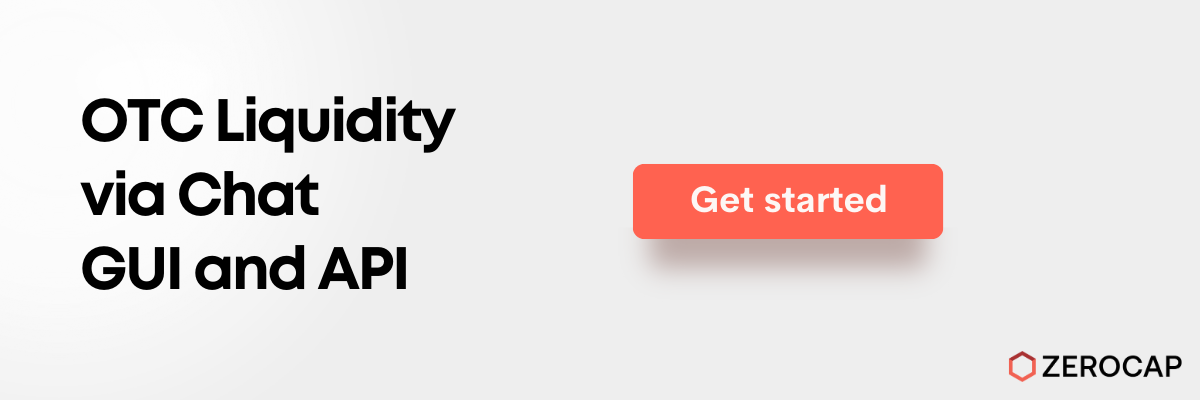Content
- Understanding Crypto Off-Ramping
- Centralized Exchanges
- Peer-to-Peer (P2P) Platforms
- Crypto ATMs
- Decentralized Exchanges (DEXs)
- Over-the-Counter (OTC) Trading
- Legal and Regulatory Considerations
- Tax Implications
- Fees and Costs
- In Summary
- FAQ
- 1. What is the safest way to off-ramp crypto in Australia?
- 2. Are there any legal requirements for off-ramping crypto in Australia?
- 3. How can I avoid high fees when off-ramping crypto?
- 4. Do I need to report off-ramping crypto to the ATO?
- 5. Can I off-ramp crypto anonymously in Australia?
- About Zerocap
5 Aug, 24
How Do I Off Ramp Crypto in Australia?

- Understanding Crypto Off-Ramping
- Centralized Exchanges
- Peer-to-Peer (P2P) Platforms
- Crypto ATMs
- Decentralized Exchanges (DEXs)
- Over-the-Counter (OTC) Trading
- Legal and Regulatory Considerations
- Tax Implications
- Fees and Costs
- In Summary
- FAQ
- 1. What is the safest way to off-ramp crypto in Australia?
- 2. Are there any legal requirements for off-ramping crypto in Australia?
- 3. How can I avoid high fees when off-ramping crypto?
- 4. Do I need to report off-ramping crypto to the ATO?
- 5. Can I off-ramp crypto anonymously in Australia?
- About Zerocap
As cryptocurrency becomes more mainstream, the need for reliable methods to convert digital assets into traditional currency, commonly known as “off-ramping,” is essential. Whether you’re an experienced trader or a newcomer to the crypto world, understanding how to off-ramp crypto in Australia is crucial. This guide will walk you through the various methods, regulations, and considerations involved in the process.

The popularity of cryptocurrencies like Bitcoin, Ethereum, and other altcoins has grown significantly in recent years. However, while many people are familiar with the process of purchasing and holding crypto, the method of converting it back into Australian dollars (AUD) is less well known. Off-ramping crypto in Australia involves understanding the available platforms, the legal landscape, and the potential fees and tax implications.
Understanding Crypto Off-Ramping
Off-ramping crypto refers to the process of converting digital assets into traditional fiat currency. In Australia, this generally means selling your crypto for AUD. This process can be done through several methods, including using centralized exchanges, peer-to-peer platforms, or crypto ATMs. Each method has its pros and cons, and the choice often depends on factors such as transaction speed, fees, and the user’s level of experience.
Centralized Exchanges
Centralized exchanges (CEXs) are the most popular platforms for off-ramping crypto in Australia. These platforms offer users the ability to sell their crypto assets directly for AUD. The process is straightforward: you transfer your crypto to the exchange, sell it for AUD, and then withdraw the funds to your bank account.
- Pros: Centralized exchanges are easy to use, especially for beginners. They offer a high level of security and customer support. Moreover, they often provide additional features like market analysis and advanced trading tools.
- Cons: CEXs typically charge transaction fees, which can vary depending on the platform and the size of the transaction. There are also withdrawal limits and verification processes that can be time-consuming.
Peer-to-Peer (P2P) Platforms
Peer-to-peer platforms allow users to sell their crypto directly to other individuals. In this method, you can negotiate the price and terms of the sale directly with the buyer. Payment methods can vary, including bank transfers, PayPal, or even cash.
- Pros: P2P platforms offer more flexibility in payment methods and can sometimes provide better rates than centralized exchanges. They also allow users to remain more anonymous compared to CEXs.
- Cons: The process can be riskier, as it involves dealing directly with another person. There’s also a need for caution to avoid scams or fraudulent transactions. Additionally, the process may take longer than using an exchange
Crypto ATMs
Another option for off-ramping crypto in Australia is using crypto ATMs. These machines allow you to sell crypto and withdraw cash instantly. Crypto ATMs can be found in major cities across Australia, including Sydney, Melbourne, and Brisbane.
- Pros: The main advantage of using a crypto ATM is convenience and immediacy. The process is fast, and there’s no need for a bank account.
- Cons: Crypto ATMs charge high transaction fees, often between 5-10%. Additionally, they may have lower transaction limits, and finding a nearby machine could be a challenge for those living outside major urban areas.
Decentralized Exchanges (DEXs)
While less common for off-ramping compared to centralized exchanges, decentralized exchanges (DEXs) can also be used. DEXs operate without a central authority, allowing users to trade directly with each other.
- Pros: DEXs provide a higher level of privacy and security since they do not require users to provide personal information. They also tend to have lower fees compared to centralized exchanges.
- Cons: DEXs are typically more complex to use and may not be suitable for beginners. The process of converting crypto to fiat currency is not as direct, often requiring additional steps or services to complete the off-ramp.
Over-the-Counter (OTC) Trading
Over-the-counter (OTC) trading involves direct transactions between two parties, often facilitated by a broker such as Zerocap. This method is typically used for large transactions, as it allows for better price negotiation and minimizes the impact on the market price.
- Pros: OTC trading is ideal for high-volume trades and offers more personalized service. It also provides better liquidity and privacy compared to traditional exchanges.
- Cons: The process can be more complicated and requires finding a reliable broker. It may also involve higher fees depending on the service provided.
Read more about on and off ramps through Zerocap.

Legal and Regulatory Considerations
Off-ramping crypto in Australia is subject to various legal and regulatory requirements. The Australian Transaction Reports and Analysis Centre (AUSTRAC) oversees the country’s anti-money laundering and counter-terrorism financing regulations, which apply to digital currency exchanges. This means that exchanges operating in Australia must register with AUSTRAC and comply with stringent Know Your Customer (KYC) and Anti-Money Laundering (AML) requirements.
Additionally, profits made from selling cryptocurrencies are subject to Capital Gains Tax (CGT) in Australia. This means that when you off-ramp crypto, you must report the transaction on your tax return and may be liable for CGT based o n the difference between the purchase price and the sale price.
Tax Implications
Understanding the tax implications is crucial when off-ramping crypto in Australia. The Australian Taxation Office (ATO) treats cryptocurrencies as property, meaning that any gains or losses made from selling crypto are subject to CGT. The CGT rate depends on your income and the length of time you held the asset. If you hold the asset for more than 12 months, you may be eligible for a 50% CGT discount.
It’s important to keep detailed records of all your crypto transactions, including the dates of acquisition and sale, the amount of crypto sold, and the AUD value at the time of the transaction. Failure to accurately report crypto transactions can result in penalties and interest from the ATO.
Fees and Costs
When off-ramping crypto, it’s essential to consider the associated fees and costs. Different platforms and methods will have varying fee structures. Centralized exchanges often charge a percentage of the transaction value as a fee, while crypto ATMs have flat fees plus a percentage. Peer-to-peer platforms may have lower fees, but users need to be cautious of hidden costs, such as currency conversion fees when dealing with international buyers.
In addition to transaction fees, consider the potential impact of slippage, especially in volatile markets. Slippage occurs when the market price changes between the time you place an order and when it’s executed, leading to a less favorable exchange rate.
In Summary
Off-ramping crypto in Australia involves a range of options, each with its own advantages and disadvantages. Whether you choose to use a centralized exchange, peer-to-peer platform, OTC Desk, or crypto ATM, it’s essential to consider the costs, legal implications, and tax obligations involved. By understanding the different methods available and the associated risks, you can make informed decisions that best suit your needs.
Converting your crypto into AUD is a crucial step in realizing the value of your digital assets, and with the right knowledge, you can navigate the process efficiently and securely.
FAQ
1. What is the safest way to off-ramp crypto in Australia?
The safest way to off-ramp crypto in Australia is through a well-established centralized exchange or OTC Desk, such as Zerocap, that complies with AUSTRAC regulations.
2. Are there any legal requirements for off-ramping crypto in Australia?
Yes, off-ramping crypto in Australia requires compliance with AUSTRAC regulations, including KYC and AML requirements. Additionally, any profits from selling crypto are subject to Capital Gains Tax.
3. How can I avoid high fees when off-ramping crypto?
To avoid high fees, compare the fee structures of different platforms. Centralized exchanges and OTC Desks such as Zerocap generally offer competitive rates, while peer-to-peer platforms might have lower fees but come with additional risks.
4. Do I need to report off-ramping crypto to the ATO?
Yes, you need to report any profits or losses from off-ramping crypto to the ATO as part of your tax return, as these transactions are subject to Capital Gains Tax.
5. Can I off-ramp crypto anonymously in Australia?
Off-ramping crypto anonymously is challenging in Australia due to stringent KYC and AML regulations. Peer-to-peer platforms offer more privacy but still require some level of identification and risk management .

About Zerocap
Zerocap provides digital asset liquidity and digital asset custodial services to forward-thinking investors and institutions globally. For frictionless access to digital assets with industry-leading security, contact our team at hello@zerocap.com or visit our website www.zerocap.com
Disclaimer: This material is issued by Zerocap Pty Ltd (Zerocap), a Corporate Authorised Representative (CAR: 001289130) of AFSL 340799. Material covering regulated financial products is issued to you on the basis that you qualify as a “Wholesale Investor” for the purposes of Sections 761GA and 708(10) of the Corporations Act 2001 (Cth) (Sophisticated/Wholesale Client). This material is intended solely for the information of the particular person to whom it was provided by Zerocap and should not be relied upon by any other person. The information contained in this material is general in nature and does not constitute advice, take into account the financial objectives or situation of an investor; nor a recommendation to deal. Any recipients of this material acknowledge and agree that they must conduct and have conducted their own due diligence investigation and have not relied upon any representations of Zerocap, its officers, employees, representatives or associates. Zerocap has not independently verified the information contained in this material. Zerocap assumes no responsibility for updating any information, views or opinions contained in this material or for correcting any error or omission which may become apparent after the material has been issued. Zerocap does not give any warranty as to the accuracy, reliability or completeness of advice or information which is contained in this material. Except insofar as liability under any statute cannot be excluded, Zerocap and its officers, employees, representatives or associates do not accept any liability (whether arising in contract, in tort or negligence or otherwise) for any error or omission in this material or for any resulting loss or damage (whether direct, indirect, consequential or otherwise) suffered by the recipient of this material or any other person. This is a private communication and was not intended for public circulation or publication or for the use of any third party. This material must not be distributed or released in the United States. It may only be provided to persons who are outside the United States and are not acting for the account or benefit of, “US Persons” in connection with transactions that would be “offshore transactions” (as such terms are defined in Regulation S under the U.S. Securities Act of 1933, as amended (the “Securities Act”)). This material does not, and is not intended to, constitute an offer or invitation in the United States, or in any other place or jurisdiction in which, or to any person to whom, it would not be lawful to make such an offer or invitation. If you are not the intended recipient of this material, please notify Zerocap immediately and destroy all copies of this material, whether held in electronic or printed form or otherwise.
Disclosure of Interest: Zerocap, its officers, employees, representatives and associates within the meaning of Chapter 7 of the Corporations Act may receive commissions and management fees from transactions involving securities referred to in this material (which its representatives may directly share) and may from time to time hold interests in the assets referred to in this material. Investors should consider this material as only a single factor in making their investment decision.
Like this article? Share
Latest Insights
Weekly Crypto Market Wrap: 21st July 2025
Zerocap is a market-leading digital asset firm, providing trading, liquidity and custody to forward-thinking institutions and investors globally. To learn more, contact the team at
Weekly Crypto Market Wrap: 14th July 2025
Zerocap is a market-leading digital asset firm, providing trading, liquidity and custody to forward-thinking institutions and investors globally. To learn more, contact the team at
Zerocap selects Pier Two to offer institutional staking yields
Institutional clients gain secure, non-custodial access to native crypto yields with top-tier infrastructure Leading digital asset firm Zerocap has selected global institutional staking provider Pier
Receive Our Insights
Subscribe to receive our publications in newsletter format — the best way to stay informed about crypto asset market trends and topics.



 Share
Share  Tweet
Tweet  Post
Post 